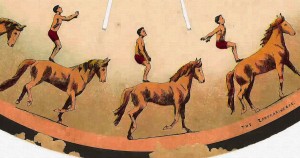Had I ever heard of the zoopraxiscope before, I’d forgotten it by the time I read Randal O’Toole’s recent critique of the latest Washington, D. C., public transit debacle, the new streetcar system. So I had to look it up.
It was an early “motion picture” projector.
In other words, an “atavism.”
According to O’Toole, “Streetcars were technologically perfected in the 1880s, so for Washington to subsidize the construction of a streetcar line today is roughly equal to … Los Angeles subsidizing the manufacture of zoopraxiscopes.”
O’Toole, a transportation specialist, argues that the new system, barely in place, but already on the hook for more subsidy to build more lines, is grossly inefficient.
As well as atavistic.
“Rather than build five more miles of obsolete line,” he concludes, “the best thing Washington can do is shut down its new line and fill the gaps between the rails with tar.”
Drastic?
Well, is it any more drastic or extreme than debuting a mass system without a fare system in place? That is, without even having decided on which payment system to use?
Unfortunately, the inefficient clunkers are unaccountably contagious. “Following Portland’s example, Atlanta, Charlotte, Cincinnati, Kansas City, and several other cities have opened or are building streetcar lines,” O’Toole explains. “Most of these lines are about two miles long, are no faster than walking, and cost $50 million or more per mile while buying the same number of buses would cost a couple million, at most.”
Politicians idolize such schemes so much that we, the taxpayers, are forced to be iconoclastic.
This is Common Sense. I’m Paul Jacob.
A healthy democracy depends on the spreading of good ideas. If you found this article useful, please share it with friends by clicking on any of the social media icons below.
Common Sense Needs Your Help!
Also, please consider showing your appreciation by dropping something in our tip jar (this link will take you to the Citizens in Charge donation page… and your contribution will go to the support of the Common Sense website). Maintaining this site takes time and money. Your help in spreading the message of common sense and liberty is very much appreciated!



